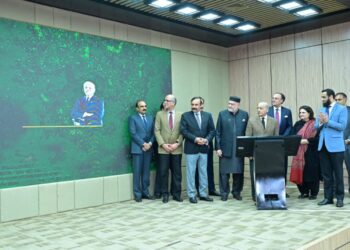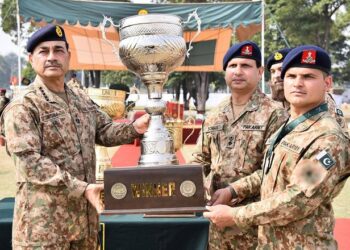During the hearing on the intra-court appeal against the Supreme Court’s decision to try civilians in military courts, Justice Naeem Akhtar Afghan remarked that international norms do not state that civilians cannot be court-martialed.
A 7-member constitutional bench headed by Justice Aminuddin Khan is hearing the case.
Salman Akram Raja, the lawyer of May 9 accused Arzam Junaid, continued his arguments and said that he will complete his arguments by 11 am today. Justice Jamal Mandokhel said that it would be better if he completed his arguments in half an hour.
Salman Akram Raja said that let me say what I want to say so that I can complete it by 11 am. In simple words, a court-martial cannot be conducted by abolishing the fundamental rights of civilians.
He argued that the court martial of the civilians is also against the international requirements of a fair trial. There is an international requirement that the trial should be in an open court, free and transparent. According to international laws, the trial decisions should be public. Appeals against the decisions of military tribunals around the world go to the courts. The decision of the European Court of Justice has also forced many countries to change the procedure of court martial.
Justice Jamal Mandokhel asked what will be the result if international norms are not followed? Salman Akram Raja replied that not following international norms means that the trial was not transparent.
Justice Jamal Mandokhel raised the question of what will happen if a country violates international norms. Salman Akram Raja replied that some international norms are obligatory and some are not. Article 10A of fair trial was made part of the constitution in the light of international norms.
Justice Naeem Akhtar Afghan remarked that there is no mention in international norms that civilians cannot be court-martialed.
Salman Akram Raja took the stand that courts-martial in the UK are conducted by independent judges, not soldiers. At the time of the FB Ali case, there was no principle of separation of powers in the constitution. Initially, the Deputy Commissioner and Tehsildar used to conduct criminal trials. It was said that if the DC can conduct criminal trials, then even a Colonel can.
Salman Akram Raja argued that all countries submit reports on the implementation of international norms to the United Nations. The UN Human Rights Committee reviews the reports and gives its opinion. Pakistan’s military justice system was reviewed in its meetings in October and November last year. The UN Human Rights Committee expressed concern over the courts-martial of civilians in Pakistan.
He said that according to the United Nations Human Rights Committee, military courts in Pakistan are not independent, the report asked the government to grant bail to those in military custody, according to the European Commission, it is not right to court-martial 9 protesters, the European Union has given GSP place status to Pakistan.
Salman Akram Raja said that Justice Yahya Afridi has raised these same points in the dissenting note, if thousands of people can be tried in the ATC, why not these 105?
During the hearing, an interesting conversation took place between Salman Raja and Justice Naeem Akhtar Afghan,
Salman Raja said that a soldier named Fedley was court-martialed in the UK, the European Court of Human Rights had declared his military trial null and void, Fedley was under mental stress, he opened fire, Justice Muhammad Ali Mazhar remarked that a TV was also broken due to Fedley’s firing, a TV was also broken in the May 9 incidents.
Salman Raja said that I met the person who broke the TV in the May 9 incidents, he was drowning in shame, the poor person who broke the TV was unemployed in four parties, what has our society done to such people.
Justice Aminuddin Khan said that do not talk about individuals, Justice Jamal Khan Mandokhel asked Salman Raja if he also met Fedli.
Justice Naeem Akhtar Afghan remarked with a smile that no, Salman Raja has met Pakistani Fedli.
Justice Hassan Azhar Rizvi said that you said that my client used to play first-class cricket, he did not go to play cricket on May 9, right? Justice Muhammad Ali Mazhar said that the law under which Kulbhushan was given the right to appeal is before us, Additional Attorney General Aamir Rehman said that I will bring that law on record.
Justice Muhammad Ali Mazhar remarked that the law was brought only for Kulbhushan, Uzair Bhandari said that such a spy who has permission from the International Court of Justice has the right to appeal, Justice Jamal Khan Mandokhel remarked that how many more Kulbhushans are there here? Additional Attorney General Aamir Rehman said that the permission for classification is also available in the FBI.

























